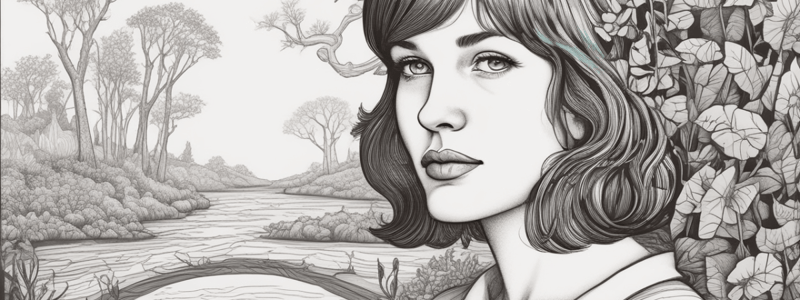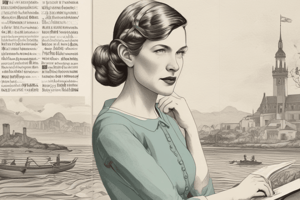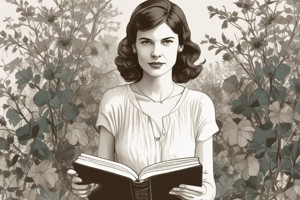Podcast
Questions and Answers
What is implied by the phrase 'reach out for something to love'?
What is implied by the phrase 'reach out for something to love'?
- A need for material possessions
- A feeling of desperation and longing (correct)
- A sense of comfort and security
- A desire for fame and recognition
What is the 'dark thing' that sleeps in the speaker?
What is the 'dark thing' that sleeps in the speaker?
- Her depression (correct)
- Her inner self
- Her hope
- Her anxiety
What is the effect of the 'soft, feathery turnings' on the speaker?
What is the effect of the 'soft, feathery turnings' on the speaker?
- They bring her comfort
- They make her feel indifferent
- They reveal her mental suffering (correct)
- They make her anxious
What do the 'clouds' represent in the poem?
What do the 'clouds' represent in the poem?
What is the effect of the natural landscape on the speaker?
What is the effect of the natural landscape on the speaker?
What is the significance of the 'face' in the final stanzas?
What is the significance of the 'face' in the final stanzas?
What is the effect of the 'snaky acids' on the speaker?
What is the effect of the 'snaky acids' on the speaker?
What is the significance of the repetition of 'kill, kill, kill'?
What is the significance of the repetition of 'kill, kill, kill'?
Who is speaking in the final stanzas?
Who is speaking in the final stanzas?
What is the overall effect of the poem on the reader?
What is the overall effect of the poem on the reader?
Flashcards are hidden until you start studying
Study Notes
Poem Analysis: "Elm" by Sylvia Plath
Themes and Ideas
- Depression
- Mental Health / Anxiety
- Psychic Landscape
- The importance of communication
Style
- Personification of the elm tree
- An imagined, psychic landscape
- Sound effects (sibilance in particular)
- Repetition
- Provocative imagery (visual, kinesthetic, auditory)
- Imagery from the natural world (elm tree, moon, sea, wind)
- Figurative language (wind as a metaphor for Plath's depression)
Key Quotes and Analysis
- "I know the bottom, she says. I know it with my great tap root: / It is what you fear. I do not fear it: I have been there."
- The elm tree understands suffering, "the bottom," right to its core
- "Is it the sea you hear in me, / Its dissatisfactions? Or the voice of nothing, that was your madness?"
- Aural imagery, assonance, and sibilance create an uncomfortable atmosphere
- "Love is a shadow. / How you lie and cry after it / Listen: these are its hooves: it has gone off, like a horse."
- The girl is mocked for mourning her lost happiness
- "All night I shall gallop thus, impetuously, / Till your head is a stone, your pillow a little turf, / Echoing, echoing."
- Plath portrays a striking depiction of how a person's inner-most thoughts and fears can consume and destroy them
- "Or shall I bring you the sound of poisons? This is rain now, this big hush. / And this is the fruit of it: tin-white, like arsenic."
- The mood shifts suddenly, with the tree wondering if it should let the girl listen to the sound of poisons
- "I have suffered the atrocity of sunsets. / Scorched to the root / My red filaments burn and stand, a hand of wires."
- The tree's tone changes, becoming more empathetic
- "Now I break up into pieces that fly about like clubs. / A wind of such violence / Will tolerate no bystanding: I must shriek."
- Depression is like the wind, causing violence and discomfort
- "The moon, also, is merciless: she would drag me / Cruelly, being barren. / Her radiance scathes me."
- The moon's radiance hurts, suggesting an emptiness
- "I let her go. / I let her go / Diminished and flat, as after radical surgery."
- The struggle between the tree and the moon is akin to internal struggle
- "I am inhabited by a cry. / Nightly it flaps out / Looking, with its hooks, for something to love."
- The tree is inhabited by a cry, symbolizing an aspect of depression
- "I am terrified by this dark thing / That sleeps in me; / All day I feel its soft, feathery turnings, its malignity."
- The tactile image reveals an uncomfortable portrayal of mental suffering
- "Clouds pass and disperse. / Are those the faces of love, those pale irretrievables? / Is it for such I agitate my heart?"
- Natural landscape allows Plath to showcase her feelings of being cut off from everything around her
- "I am incapable of more knowledge. / What is this, this face / So murderous in its strangle of branches? / Its snaky acids hiss. / It petrifies the will."
- The final two stanzas merge the voices, making it difficult to tell who is speaking
- The repetition of "kill" emphasizes the destructive nature of depression
Studying That Suits You
Use AI to generate personalized quizzes and flashcards to suit your learning preferences.




